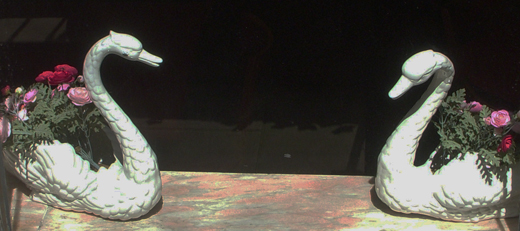
I used to feel guilty about not having read any of George Orwell’s books. Surely it was virtually illiterate of me not to have read the famous nightmares, Animal Farm and 1984, whether I liked them or not. The three accounts of unlucky life in the Thirties — Down and Out in Paris and London, The Road to Wigan Pier, and Homage to Catalonia — seemed always to be highly regarded. Not have to read Orwell was yet another sign of my frivolous dilletantism. I felt bad about it, as I say, but not bad enough to alter my reading pile.
In fact, of course, I’d read a great deal of Orwell, here and there, mostly but not exclusively in magazines, over forty-odd years — and that, I think, is what stanched any desire for more. I didn’t think much about it; if I didn’t much care for Orwell’s way of putting things, I didn’t regard it as harmful. Orwell fell into a zone that’s populated by many Twentieth-Century writers for whose work I don’t have much use: I call it Dorm Lit. Dorm Lit appeals to bright, adolescent Prince Valiants who don’t — can’t — yet know much of anything about the world beyond their own experience and who are therefore easily roused by tales of injustice. Lacking a knightly nature, I arranged the rights and wrongs of this world along a different pole. I couldn’t have told you what that was until I read James Woods’s appraisal of Orwell in a recent issue of The New Yorker, “A Fine Rage.” Here it is, in one sentence:
Modern life should be simpler and harder, he argues in this vein, not softer and more complex, and “in a healthy world there would be no demand for tinned foods, aspirins, gramophones, gaspipe chairs, machine guns, daily newspapers, telephones, motor-cars, etc, etc.” Note that “etc” — there speaks the puritan, reserving the right to stretch his prohibitions, at cranky whim.
There has not been a lot of oxygen, until fairly recently, for the idea that life is, unavoidably, “more complex,” and I was well into middle age before it was clear to me that people who mistrust complexity are usually rather stupid about it. What they are usually talking about, as is clear from Orwell’s little list of things that wouldn’t be missed, is the manifold. True complexity isn’t even reached. Orwell’s targets are, for the most part, modern appliances, and most of them are far more complex today than they were when Orwell took pot shots at them. Once upon a time, the home telephone had only one function: facilitating the two-party conversation. Now it has been merged with the “gramophone” and the daily newspaper, all because thousands of users made ever-more complex demands upon it. Orwell is very simply the dimwit who asks — or who used to ask — what on earth he would do with a personal computer: he would have been in no position to pass judgment upon it. By the same token, I am unable to come out for or against any item on his list, except perhaps machine guns. Even “tinned food” has its place in the best kitchens.
The simple life appeals to everyone now and then, but to some people it assumes the sanctity of a moral obligation. Occasionally, somebody writes powerfully about the beauty of doing without, and the simple life begins to look fashionable. But it can never actually be fashionable, because fashion of any kind is entirely a matter of sifting small differences in search of new ideas. It short it is inherently complex. (Without the stylistic or intellectual discipline that always informs fashion, it would be merely complicated.) Fashions may mean nothing to those who don’t care about them, but they tire out their exponents, who, at the end of the day, demand a soft — or at least a softly-lighted — environment, and who, after a certain age at least, are unlikely to seek out the “harder” just for its own sake.
Injustice itself is rarely, anymore, a matter of the brute violence that disgusts youthful minds. It stems more freely from simplifications, from failures to understand that what works in this situation does not work in that one. Our ideas of property rights have been almost hopelessly fouled by the refusal to admit kinds or degrees of such rights. We don’t even acknowledge the most obvious characteristic of ownership: the right to preserve or to destroy. What we own is the right to deal with certain things — things that belong to us — more or less violently. While the right to preserve is usually but not always a good thing, the right to destroy is certainly more difficult to assess. Treating them as the same kind of right is stupid — but what do you expect from idealists who disapprove of private property itself, or from those who are backed, by opposition, into holding that private property is as sacred as life itself.
Mr Wood’s summary of Orwell’s thinking turns out to be an uncannily accurate negative of my own, but there is one other aspect of it that I’d like to note.
So the question hangs over Orwell, as it does over so many well-heeled revolutionaries. Did he want to level up society or level it down? … A similarly telling moment appears in Orwell’s review of Friedrich Hayek’s The Road to Serfdom (1944). There was much in the book to agree with, Orwell said. … But Hayek’s faith in capitalist competition was overzealous. “The trouble with competitions is that somebody wins them.” Not, you notice, that somebody loses them — which would mean raising those people up. Somebody wins them, and that cannot be allowed.
I am a passionate leveler-up. I would like everyone to have access to my softer, more complex way of life.
















